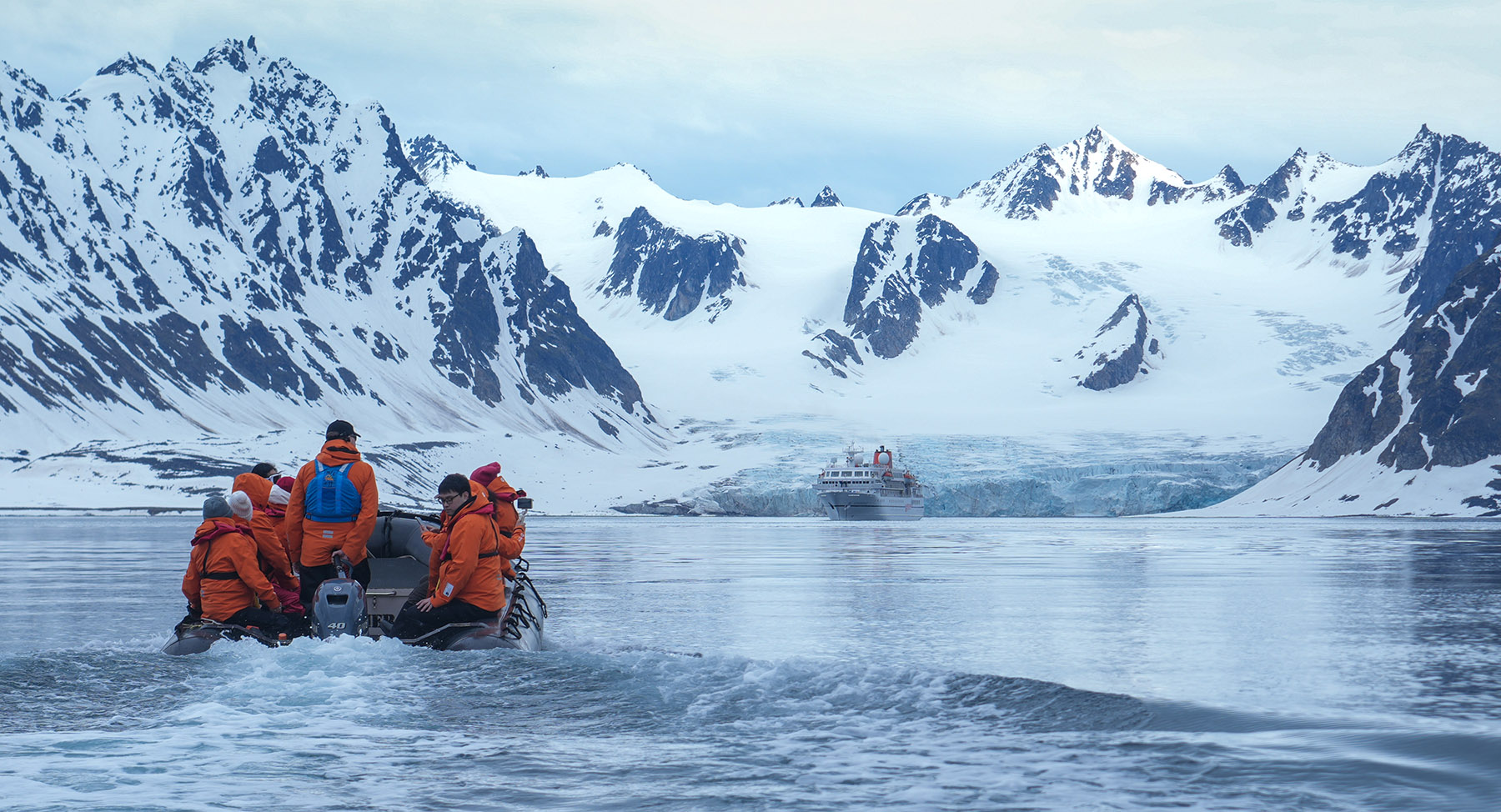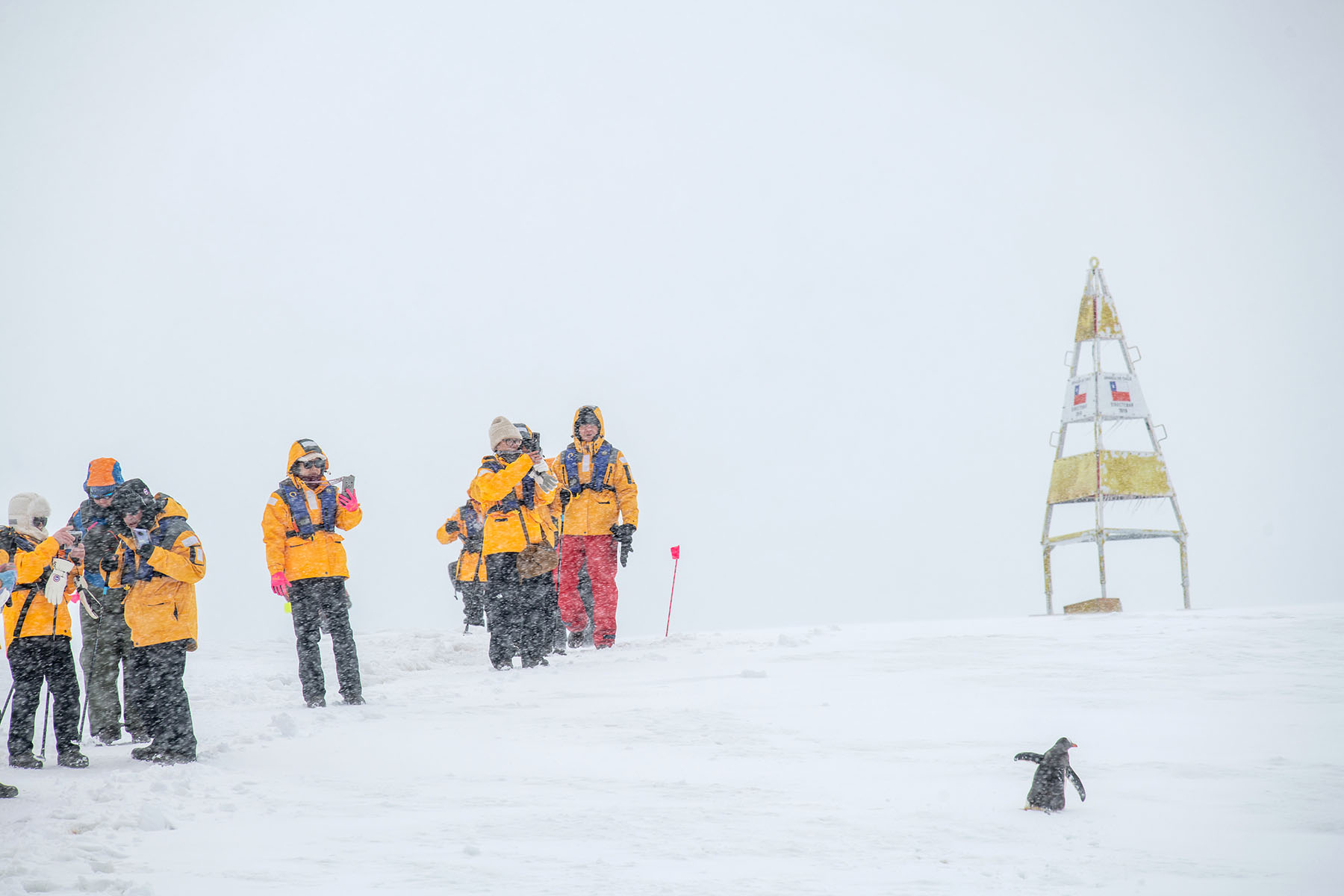High demand for Arctic and Antarctic itineraries has travel companies scrambling to offer unique experiences to Chinese adventurers, Yang Feiyue reports.

Dawn breaks in the Arctic over a silent world of frozen water, its pale light glinting off drifting ice floes, where polar bears are no strangers to the cold, stark white.
For Wang Helin, a seasoned Chinese guide with over 100 polar expeditions under his belt in the past seven years, such scenes are deeply familiar.
Yet recently, amid the crunch of ice and vast expanse of white, something new has cut through the cold — a sound he's hearing more and more often — the warm, distinct cadence of Mandarin.
The Arctic wilderness once echoed primarily with Western languages, but now Wang regularly greets travelers from Beijing, Shanghai, and Guangzhou, Guangdong province.
In May, Wang joined the 66 Degrees Expeditions, China's first polar cruise operator, which was established last year.
As an expedition guide, Wang sees his role as a guardian of the guests' safety in the wilderness.
"When sudden weather changes occur, our first response is to activate contingency plans, adjust itineraries, or arrange expert talks and alternative landing sites to maintain safety and ensure a rich experience," he explains.
READ MORE: Cross-border tourism on the right track
From vigilantly watching for polar bears to navigating small, heavy-duty inflatable boats across the Arctic waters, every decision and action is guided by the highest standards of caution and care, he emphasizes.
In his first three and a half months with 66 Degrees Expeditions, Wang interacted with many Chinese guests. "What stood out most was their strong sense of pride and identification with having a Chinese-owned polar expedition business," Wang notes.
Polar travel has captured the imagination of a growing number of Chinese tourists.
On Xiaohongshu (RedNote), a popular social media platform, posts related to Arctic and Antarctic travel have exceeded 400,000. Users enthusiastically share tips and seek travel companions.
The glaciers of Antarctica, the auroras of the Arctic, and the rare wildlife found only in polar regions have made these remote areas some of the world's most unique and breathtaking destinations. For many Chinese travelers, visiting the Earth's extremes has become a bucket-list item.
Zhao Xin, head of the polar cruise center at the Beijing-based Utour travel agency, says that the 2024-25 season has seen unprecedented demand for Antarctic tours.
The agency organized trips for 1,200 tourists, with packages selling out three months in advance.
"The rise of social media has dramatically increased awareness for niche, high-end destinations like the polar regions," Zhao notes.
"While elderly travelers once dominated these destinations, younger tourists are now joining in significant numbers," he adds.

Given the growing enthusiasm among Chinese tourists for Antarctic travel, Zhao anticipates that Utour will experience a significant increase in visitors in the upcoming seasons.
It is projected that the number will rise to 1,500 during the 2025-26 season and 1,600-1,700 in the 2026-27 season, says Zhao.
According to the International Association of Antarctica Tour Operators, a record-breaking 122,072 travelers visited Antarctica during the 2023-24 travel season, among whom 9,384 were from China — marking a record high in the number of Chinese visitors.
Zhao emphasizes that the polar tourism market now demands higher comprehensive management capabilities from travel agencies.
This includes precise cost control, optimized resource procurement, cruise operations, and service expenses, as well as rational financial planning, he explains.
In addition, companies must focus on product innovation by developing niche in-depth itineraries, creating unique experiential activities, and enhancing product differentiation — all while keeping high-quality service at the core, he adds.
The rise of Chinese travelers to polar destinations has given rise to 66 Degrees Expeditions, marking a turning point in China's presence in the global polar travel market.
Over the past year, the company's flagship vessel, Seaventure, has completed more than 10 polar voyages since its maiden departure from Aberdeen, UK, on May 16, safely transporting over 1,500 passengers.
According to Zheng Minqi, marketing director of 66 Degrees Expeditions, Chinese and Western travelers share core motivations — capturing stunning landscapes, learning through exploration, and connecting with like-minded individuals.
However, Chinese travelers place a stronger emphasis on instant shareability and memory preservation.
"They want to share their experiences in real time and capture their journey through high-quality photos, videos, or even custom-made documentaries," Zheng explains.

To meet these needs, the Chinese travel brand has introduced specialized services, including professional photography guides who assist with composition and camera settings, daily curated photo packages for easy sharing, and personalized documentary editing services that combine passengers' footage with breathtaking polar visuals.
When it comes to booking, Zheng points out that high-end polar itineraries typically require reserving six to 12 months in advance, with popular routes selling out even earlier. While specialized travel agencies remain the primary booking channel due to their ability to handle complex logistics, such as international flights, visas, and ground services, partnerships with educational institutions, business schools, and media organizations are also growing.
These groups often collaborate with travel agencies to design themed trips, such as scientific research expeditions or leadership development courses in polar settings.
The typical Chinese polar traveler is between 35 and 70 years old, primarily from first and second-tier cities, such as Beijing, Shanghai, and Guangzhou and Shenzhen in Guangdong province, Zheng says.
Family trips are common, with many travelers bringing their children or elderly parents, though couples and solo "polar geeks" also form a significant segment, she adds.
"Many travelers also invest in professional gear, such as high-end cameras and functional clothing, for their journey," she says.
Mid- to high-range cabins are the most popular for balancing comfort and value, though some opt for top-tier suites for special occasions.
"Onboard, photography workshops and specialty dining experiences are well-received."
China's polar tourism industry has evolved over the past decade.
In earlier years, Chinese tourists booked trips through international operators or directly with cruise lines. Between 2010 and 2015, rising disposable incomes sparked demand, leading major Chinese agencies, like Beijing-based Utour, to charter ships for polar expeditions.
The market grew significantly from 2016 to 2017, with additional travel companies entering the field and diversifying their offerings.
Although the COVID-19 pandemic brought growth to a halt, the pent-up enthusiasm for polar exploration has been steadily rebounding.
Looking ahead to 2026, 66 Degrees Expeditions plans to enhance its new culturally themed voyages, including traditional Chinese medicine wellness lectures, and new itineraries, such as West African island voyages, offering travelers diverse polar experiences.
ALSO READ: Achieving core goals
For Wang, the growing presence of Chinese travelers in the polar regions gives him personal and professional joy. "Explaining marine biology and conservation in Mandarin creates a deeper connection," he says.
Watching the faces of Chinese guests as they glimpse a blue whale rising from the sea, Wang sees a shift in consciousness.
As he shares how global whaling bans in 1969 have slowly allowed these giants to return, something deepens in his Chinese guests' expressions.
"It is the quiet awakening of responsibility, and the sense that they, too, have a role to play in this story of recovery," Wang says.
"They aren't just observing — they are participating," Wang reflects.
"Through hearing the story in their own language from a Chinese guide, they feel included. It becomes their legacy to protect."
Contact the writer at yangfeiyue@chinadaily.com.cn


